Books and Chapters
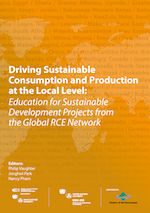 |
Driving Sustainable Consumption and Production at the Local Level: Education for Sustainable Development Projects from the Global RCE Network This publication from UNU-IAS features 12 innovative education projects on the topic of sustainable consumption and production (SCP), developed by RCEs around the world. The projects, which all focused on SDG 12 (responsible consumption and production), demonstrate the impact of multi-stakeholder community-based education on SCP, and cover a range of critical factors of SCP: resource efficiency; waste management and minimisation; and consumer behaviour. Each project (also featured in this video) details actions that were taken by the RCE, and invites readers to apply the best practices of multi-stakeholder engagement and action-oriented learning in their regions to promote sustainable consumption and production systems. |
 |
Engaging Communities for Biodiversity Conservation: Education for Sustainable Development Projects from the Global RCE Network This publication from UNU-IAS highlights innovative biodiversity education projects developed by RCEs throughout the period of the Global Action Programme (GAP) on Education for Sustainable Development (ESD) from 2015-2019. Featured are 12 case studies that focused on SDG 14 (Life Below Water) or SDG 15 (Life on Land), which served to educate, engage, and spur action in communities towards the protection and restoration of ecosystems, species, and habitats. The innovative solutions (also featured in this video) looks at how RCEs, in the face of local biodiversity issues and challenges, developed innovative ways to bring about action through education in their local context and region. |
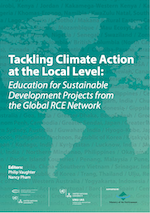 |
Tackling Climate Action at the Local Level: Education for Sustainable Development Projects from the Global RCE Network This publication from UNU-IAS highlights outstanding climate education projects from across the Global RCE Network to implement the SDGs through education at the local and regional levels during the Global Action Programme (GAP) on Education for Sustainable Development (ESD) from 2015-2019. The 12 projects featured cover a broad range of sustainable development challenges, however all include a focus on SDG 13 (Climate Action). The innovative solutions (also featured in this video) showcase examples of how global goals can be translated into local actions through education and training to respond to the climate crisis. View the publication (interactive) |
 |
RCE Project Trends during the Global Action Programme on ESD (2015-2019) During the Global Action Programme (GAP) on ESD, from 2015-2019, RCEs conducted close to 480 projects across 46 countries. Following on from the video released in 2020 highlighting the research that was conducted on these projects, this booklet presents this analysis in full. Covering RCE projects at a global and regional level, the analysis conducted by Dr. Philip Vaughter (Research Fellow, UNU-IAS) and Dr. Fumiko Noguchi (Research Fellow, UNU-IAS) looks at the SDGs, themes, institutions, audiences and environments across the RCE projects completed, which highlight the areas and initiatives undertaken within the network for transformative learning at the local level. View the publication (interactive) |
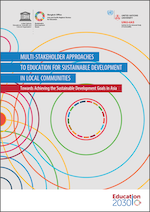 |
Multi-stakeholder Approaches to Education for Sustainable Development in Local Communities: Towards Achieving the Sustainable Development Goals in Asia This publication from UNESCO Bangkok and UNU-IAS, ‘Multi-stakeholder Approaches to Education for Sustainable Development in Local Communities: Towards Achieving the Sustainable Development Goals in Asia’, presents a collection of case studies from RCEs in the Asia-Pacific region, demonstrating innovative approaches to ESD through multi-stakeholder partnerships at the local level. |
 |
RCE Contributions to a More Sustainable World: Celebrating Five Years of Innovative Projects on Education for Sustainable Development (2015-2019) This publication highlights and celebrates some of the outstanding contributions that RCEs have made to implement the United Nations’ Sustainable Development Goals (SDGs) through education at local and regional levels, during the first five years of the SDGs as well as the Global Action Programme (GAP) on Education for Sustainable Development (ESD) from 2015-2019. Featuring 12 education projects which have all been recipients of the RCE Awards over the last five years, the collection of case studies demonstrate how RCEs have addressed local sustainable development challenges with innovative solutions, and provide diverse examples of how the SDGs can be implemented at the local level through quality education, training and public awareness. View the publication (interactive) |
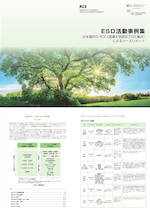 |
Good Practices for ESD: Case Reports from Japanese RCEs This publication aims to further develop Japanese RCE activities by presenting their good practices in ESD and how they contribute to global RCE activities. Access the publication (in Japanese) here |
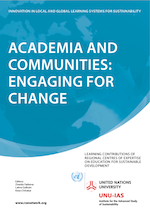 |
Academia and Communities: Engaging for Change – Learning Contributions of RCEs on ESD Increasingly, higher education institutions (HEI) and other knowledge organisations engaged with research and education are focusing on how they can address sustainable development challenges. A key to solving such complex problems is knowledge co-creation involving a variety of forms of cooperation among diverse stakeholders. The Education for Sustainable Development Project at UNU-IAS has worked with Regional Centres of Expertise (RCEs) worldwide to look at how this can be fostered through the engagement of knowledge institutions and communities, including at the local level. These contributions look at the ways in which local development problems can be approached through a variety of ESD forms and practices initiated by the multi-stakeholder networks of the RCEs, and which contribute to the ambitions of the GAP (Global Action Programme on ESD). To download the book: click here |
 |
Ensure Healthy Lives and Promote Well-being For All: Experiences of community health, hygiene, sanitation and nutrition within Regional Centres of Expertise on ESD Globally, the world faces many health-related challenges, from gaps in health literacy to inadequate health systems. Addressing these issues is complex but achievable, with health education and providing safe learning environments being some of the significant contributors to ensuring healthy lives for individuals and communities. The Education for Sustainable Development Programme at UNU-IAS has worked with Regional Centres of Expertise (RCEs) worldwide on a series of case studies to showcase their sustainability initiatives in the areas of health, including proximate determinants and drivers of health such as hygiene, sanitation and nutrition. These highlight how collective action at a local level is critical for addressing the health challenges the world faces today, through a participatory approach and multi-stakeholder networking. To download the book click here |
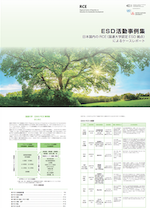 |
Good Practices for ESD: Case Reports from Japanese RCEs This publication aims to further develop Japanese RCE activities by presenting their good practices in ESD and how they contribute to global RCE activities. Access the publication (in English) here |
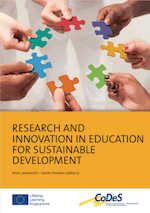 |
Research and Innovation in Education for Sustainable Development Wim Lambrechts and James Hindson (editors) with contributions by RCE Penang and UNU-IAS on Chapter 4 “Schooling for Education for Sustainable Development: The contributions of Asia-Pacific” based on a survey made by RCE Penang across the Asia-Pacific RCEs (p. 44). This book is the outcome of the work of Environment and School Initiatives (ENSI), an international network of educational partners, and the European project CoDeS,Collaboration of Schools and Communities for Sustainable Development (2011-2014). The objective of this publication is to provide collaborative experiences in ESD research and innovation. It provides a look back at initiatives during the DESD and an outlook on future possibilities in the field of research and education for sustainable development during the GAP. Click to download the book |
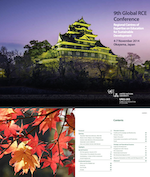 |
9th Global RCE Conference Proceedings Booklet The 9th Global RCE Conference was successfully held in Okayama, Japan (4-7 November 2014). It was a great opportunity to bring together a wide variety of stakeholders – from cities, communities, governments, industry, international organizations, and academia – to discuss, debate and launch activities that reinforce the fundamental role that education plays in achieving a sustainable future worldwide. RCE Okayama hosted the conference. The conference booklet is now online here |
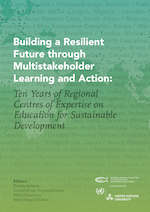 |
Ten Years of Regional Centres of Expertise on Education for Sustainable Development The global movement of Regional Centres of Expertise on ESD (RCEs), having reached a decade of existence and of constantly contributing to change through learning and action, is deserving of a commemorative memento. As the United Nations Decade on Education for Sustainable Development (DESD), upon which the RCE movement was founded and to which it was dedicated, draws to a close, it is also a critical time to look towards the future of the RCE community against the backdrop of the new processes taking shape in sustainable development and education. This publication is the tale of an extraordinary grassroots movement conceived at the turn of the century and dedicated to the proposition that unless local stakeholders work together to find and implement local solutions to local sustainable development problems, all efforts to translate global sustainable development policy and vision into local realities might be in vain. This book draws upon earlier analyses and publications as well as recent reflections of the RCEs showing the colourful diversity of organizational cultures and approaches in promoting ESD worldwide. On the other hand, it renders possible the identification of common tendencies and emerging qualities, despite the different cultural, social and economic contexts, target groups and action areas. Click to download the English Version |
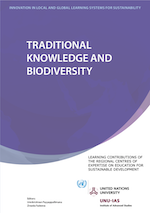 |
Traditional Knowledge and Biodiversity within Regional Centres of Expertise in ESD Regional Centres of Expertise (RCEs) were developed as sites for participatory learning and action within the United Nations Decade of Education for Sustainable Development (DESD), opening up more collaborative and inclusive learning spaces towards more just and sustainable ways of life now and in the future. Some of the contours of these emergent education processes of collaborative learning-to-change as they relate to traditional knowledge (TK) and biodiversity are developing in many RCE contexts today. The Education for Sustainable Development Programme at UNU-IAS has worked with RCEs worldwide to create a new publication showcasing a series of case studies in this regard. To download the book click here |
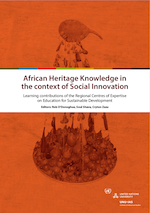 |
African Heritage Knowledge in the Context of Social Innovation and RCEs Regional Centres of Expertise (RCEs) were developed as sites for participatory learning and action within the United Nations Decade of Education for Sustainable Development (DESD), opening up more collaborative and inclusive learning spaces towards more just and sustainable ways of life now and in the future. Some of the contours of these emergent education processes of collaborative learning-to-change as they relate to African heritage knowledge in the context of social innovation are developing in many RCE contexts today. The Education for Sustainable Development Programme at UNU-IAS has worked with RCEs across the African continent and in particular southern Africa to create a new publication showcasing a series of case studies in this regard. To download the book click here |
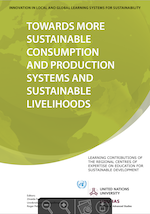 |
Towards Sustainable Livelihoods and Consumption & Production Through ESD To build a socially just economy and a more sustainable society, our consumption and production systems must become more sustainable -- not only in terms of market growth and resilience, but also in terms of productive non-market relations, ecosystem health, quality of life and the well-being of all involved. The Education for Sustainable Development programme at UNU-IAS has just published a book of case studies, showcasing groundbreaking education for sustainable development (ESD) initiatives that address some of the greatest challenges we face in moving to more sustainable consumption and production systems. Please click here to download the book |
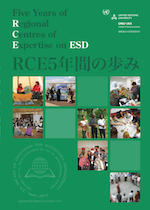 |
Five Years of RCEs - Japanese At the UNU-UNESCO International Conference on Globalisation and Education for Sustainable Development in 2005 which celebrated the Asia-Pacific launch of the United Nations Decade of Education for Sustainable Development (DESD), the United Nations University (UNU) launched the first group of seven RCEs. In five years of development, the RCE community has come a long way. Challenges and struggles bore fruit of discoveries and innovations. This publication shares lessons from RCEs and their partners at the regional and international levels. As of April 2010, there were 75 RCEs worldwide. Click here to download Japanese version |
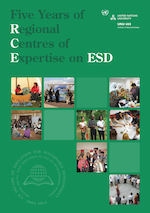 |
Five Years of RCEs - English At the UNU-UNESCO International Conference on Globalisation and Education for Sustainable Development in 2005 which celebrated the Asia-Pacific launch of the United Nations Decade of Education for Sustainable Development (DESD), the United Nations University (UNU) launched the first group of seven RCEs. In five years of development, the RCE community has come a long way. Challenges and struggles bore fruit of discoveries and innovations. This publication shares lessons from RCEs and their partners at the regional and international levels. As of April 2010, there were 75 RCEs worldwide. Click here to download English version |


